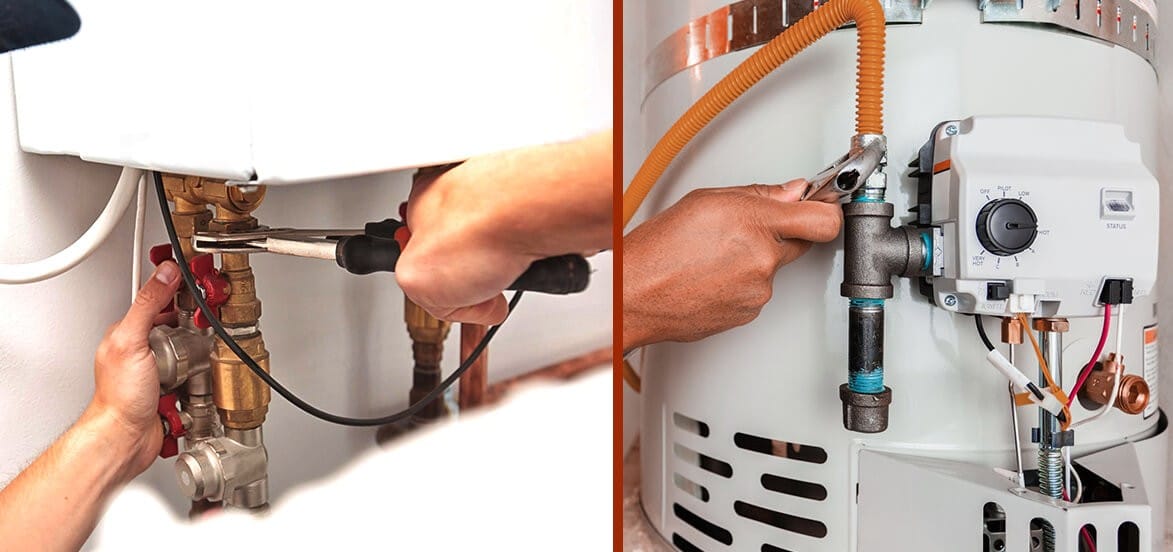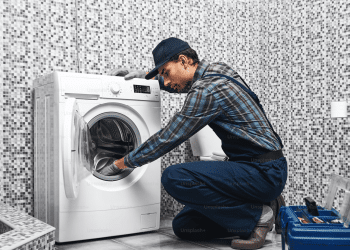Table of Contents

Your water heater is one of the most essential appliances in your home. It provides the hot water you need for bathing, cooking, and cleaning. However, it won’t last forever. Aging units are less efficient, which leads to higher energy bills and inconsistent performance. Strange noises, leaks, and discolored water are all signs that your system may fail. Here are some key factors that impact your water heater’s lifespan and efficiency to help you decide whether to fix your water heater or choose a replacement.
How Long Does a Water Heater Typically Last?
A water heater’s lifespan depends on the type, maintenance, and overall usage. Traditional tank water heaters usually last 8 to 12 years, while tankless models can function efficiently for 20 years or more. Tank heaters endure constant wear and tear from storing and reheating water, leading to sediment buildup and corrosion over time. Regular maintenance, such as flushing the tank and replacing the anode rod, can help your water heater last longer, but once rust or leaks develop, you usually need to replace it.
Tankless water heaters last longer because they heat water on demand rather than storing it. However, they are still vulnerable to mineral buildup. Routine descaling and maintenance can help preserve their efficiency for decades. If your water heater shows signs of decline, upgrading to a newer, more efficient model can improve performance and reduce energy costs.
Signs Your Water Heater Might Be Failing
1. Inconsistent Hot Water
If your water temperatures fluctuate while showering or washing dishes, your water heater might be unable to maintain a consistent supply. This could be due to sediment buildup in the tank, a failing heating element, or a malfunctioning thermostat. If adjusting the thermostat doesn’t help, it may be time to have a professional inspect your unit.
2. Strange Noises
Loud banging, popping, or rumbling sounds from your water heater are signs of trouble. These noises are often caused by hardened sediment that has built up inside the tank. As the water heats, the trapped sediment shifts, making these noises and causing excessive wear and tear. If left unaddressed, the sediment can cause overheating, cracks in the tank, and leaks. Regularly flushing the tank can help reduce this buildup.
3. Leaks
Never ignore a leak coming from your water heater. Even a small leak can quickly lead to significant water damage and mold growth. Common causes of leaks include corrosion, worn-out valves, or a cracked tank. If you spot moisture or pooling water around the heater’s base, address the issue immediately. If the tank is compromised, replacing the unit is the safest option.
4. Rising Energy Bills
If your energy bills have steadily increased without a clear explanation, your water heater could be to blame. Older water heaters require more energy to produce the same amount of hot water. Sediment buildup or a faulty heating element can all contribute to higher utility costs. Upgrading to a newer, more energy-efficient model can significantly reduce monthly expenses while ensuring a reliable hot water supply.
Repair vs. Replacement: How to Decide
If you are asking yourself when should you replace a water heater, the answer depends on its age, efficiency, and the issue’s severity. If your unit is less than 10 years old and experiencing minor problems like a faulty thermostat, heating element, or a small leak from a valve, a repair may be the most cost-effective option. Routine maintenance can restore efficiency and extend the lifespan of your heater. However, a replacement might be the better long-term solution if repairs are becoming frequent or costly. Replacement is often the smarter choice if your water heater is over 10 to 12 years old, has significant corrosion, persistent leaks, or rising energy costs.
For tankless water heaters, repairs are often worthwhile if the unit is under 20 years old and experiencing minor issues like a clogged filter, faulty heating element, or sensor malfunction. Regular descaling can help prevent mineral buildup and extend its efficiency. However, if a tankless system requires frequent repairs or struggles to provide consistent hot water, replacing it with a newer model may be a better investment.
Choosing the Right Replacement: Tank vs. Tankless Water Heaters
When replacing your water heater, one of the most significant decisions is whether to choose a traditional tank model or a tankless system. Tank water heaters store and continuously heat a set amount of water. They are generally more affordable upfront and easier to install. However, they take up more space, have higher energy costs due to standby heat loss, and typically last 8 to 12 years before needing replacement.
By contrast, tankless water heaters heat water on demand and provide unlimited hot water using less energy. They are more compact, last up to 20 years or more, and can lower energy bills by eliminating standby heat loss. However, they have higher upfront costs and may require additional upgrades, such as improved gas lines or electrical systems.
Energy Efficiency Considerations for a New Water Heater
A more energy-efficient water heater can significantly reduce utility bills while providing better performance. Even if sticking with a traditional water heater, newer models with improved insulation and high-efficiency burners help reduce energy consumption. Choosing an ENERGY STAR-certified model can lead to 10–20% energy savings compared to older, less efficient units.
For more significant energy savings, consider upgrading to a tankless system. While a tankless water heater’s higher upfront cost can be a drawback, the long-term savings on energy bills often make them a worthwhile investment.
When to Call a Professional for an Inspection
Regular inspections can help prevent costly repairs and unexpected water heater failures. If your unit shows signs of wear, reduced efficiency, or potential safety hazards, call a professional to diagnose the issues before they worsen.
If you notice any of the following warning signs, it’s best to schedule a professional inspection:
- Inconsistent water temperature
- Unusual noises
- Visible leaks
- Discolored or rusty water
- Rising energy bills
- Frequent repairs
Making the Right Decision for Your Water Heater
Deciding when to replace your water heater can impact your comfort and wallet. Pay attention to warning signs to help you determine whether it’s time for a replacement. Whether you opt for a traditional tank model or a more efficient tankless system, upgrading to a newer unit can improve your home’s energy efficiency and reduce long-term utility costs. Regular maintenance and timely inspections by a professional can also help extend the life of your unit.







